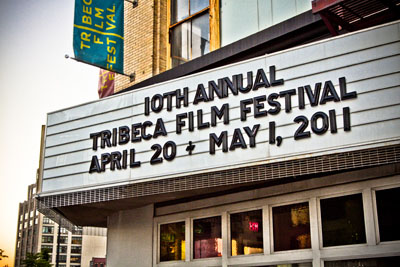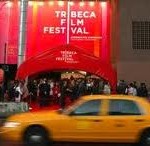Tribeca Turns Ten
Written by: FFT Webmaster | April 19th, 2011
The Tribeca Film Festival, which begins on April 20, turns ten years old this year. It seems like only yesterday that the event sparked controversy (and not a little enmity) among the denizens of the city’s arthouse upper crust. Launched a few months after the event of 9/11 by Robert De Niro, a downtown celebrity and major property owner, the Festival was designed to create interest and to attract locals and tourists back to the neighborhoods economically devastated by the collapse of the Twin Towers. Corporate giant American Express made a multi-year, multi-million dollar investment in the project, and still remains its most prominent and visibile supporter.
 The first few years of the Festival, which was almost exclusively held in the downtown Tribeca neighborhood within spitting distance of Ground Zero, was a decidedly middlebrow affair, with a free-for-all mix of art, entertainment and community events that raised eyebrows and not a few cackles from the snooty cinephile crowd more accustomed to the tonier environment of the Museum of Modern Art or Lincoln Center. If anything, the Festival consciously decided to define itself as a populist event, in direct contrast with the boutique showcases of the more established New York Film Festival and New Directors/New Films, the recently concluded springtime showcase sponsored by the Museum of Modern Art and the Film Society of Lincoln Center.
The first few years of the Festival, which was almost exclusively held in the downtown Tribeca neighborhood within spitting distance of Ground Zero, was a decidedly middlebrow affair, with a free-for-all mix of art, entertainment and community events that raised eyebrows and not a few cackles from the snooty cinephile crowd more accustomed to the tonier environment of the Museum of Modern Art or Lincoln Center. If anything, the Festival consciously decided to define itself as a populist event, in direct contrast with the boutique showcases of the more established New York Film Festival and New Directors/New Films, the recently concluded springtime showcase sponsored by the Museum of Modern Art and the Film Society of Lincoln Center.
 Ten years hence, the Festival still retains its populist aesthetic, mixing challenging indie and world cinema with easy-to-digest sports films and Hollywood light fare. Movie stars, including the Festival’s own godfather Robert De Niro, are a key element, and red carpets are de rigeur events that attract the attention of both the public and the press. In its present incarnation, the main change from the Festival’s origins is that almost none of the screenings and events actually happen in the downtown Tribeca neighborhood. The great majority of films will screen at multiplexes in the East Village and Chelsea areas, two parts of the city that were never particularly effected by the 9-11 disaster. That the Festival honchos still mention that the Festival’s raison d’etre is community development of a devastated downtown is factually untrue and slightly cloying. There is no doubt that it has parlayed its community conscious into convincing corporate heavyhitters and the city itself into supporting the event with a budget that is head and shoulders over any comparable film event in town. Eyebrows continue to be raised by some, but for most New Yorkers, the Tribeca Film Festival has become a welcome harbinger of spring, where specialty films rub shoulders with more populist fare. Tribeca has been good for movies, an endangered species if there ever was one, and for New York.
Ten years hence, the Festival still retains its populist aesthetic, mixing challenging indie and world cinema with easy-to-digest sports films and Hollywood light fare. Movie stars, including the Festival’s own godfather Robert De Niro, are a key element, and red carpets are de rigeur events that attract the attention of both the public and the press. In its present incarnation, the main change from the Festival’s origins is that almost none of the screenings and events actually happen in the downtown Tribeca neighborhood. The great majority of films will screen at multiplexes in the East Village and Chelsea areas, two parts of the city that were never particularly effected by the 9-11 disaster. That the Festival honchos still mention that the Festival’s raison d’etre is community development of a devastated downtown is factually untrue and slightly cloying. There is no doubt that it has parlayed its community conscious into convincing corporate heavyhitters and the city itself into supporting the event with a budget that is head and shoulders over any comparable film event in town. Eyebrows continue to be raised by some, but for most New Yorkers, the Tribeca Film Festival has become a welcome harbinger of spring, where specialty films rub shoulders with more populist fare. Tribeca has been good for movies, an endangered species if there ever was one, and for New York.
 Tribeca continues to try and find its niche in the city’s crowded cultural calendar. The New York Film Festival, held in the Fall, is more stuffy and formal, showing fewer than 30 films in their program. By contrast, Tribeca is a much more dense event, with some 200 features, documentaries and short films included in the mix. Taking more of a smorgasboard approach (a little something for every taste) instead of a boutique, upper crust curatorial rigour practiced by the New York Film Festival and its sister event New Directors/New Films, the Festival is unabashedly an event that revels in its “we are you and you are us” ethos, while still delivering a program of challenging and engrossing films, many of which will never get seen beyond the Festival’s own screens.
Tribeca continues to try and find its niche in the city’s crowded cultural calendar. The New York Film Festival, held in the Fall, is more stuffy and formal, showing fewer than 30 films in their program. By contrast, Tribeca is a much more dense event, with some 200 features, documentaries and short films included in the mix. Taking more of a smorgasboard approach (a little something for every taste) instead of a boutique, upper crust curatorial rigour practiced by the New York Film Festival and its sister event New Directors/New Films, the Festival is unabashedly an event that revels in its “we are you and you are us” ethos, while still delivering a program of challenging and engrossing films, many of which will never get seen beyond the Festival’s own screens.
With indie and world cinema films having an increasingly more difficult time wrangling distribution deals, the sad reality is that most of the films that will be screened at the Festival, which runs through May 1, will not find a significant audience beyond the Festival trappings. Tribeca is attempting to right that situation with an ambitious program of presenting a baker’s dozen of films on a video on demand basis both during and after the Festival’s actual dates (more on this in a future article). In this, and many other ways, Tribeca has staked its claim and continues to evolve as its tenth anniversary rapidly approaches.

